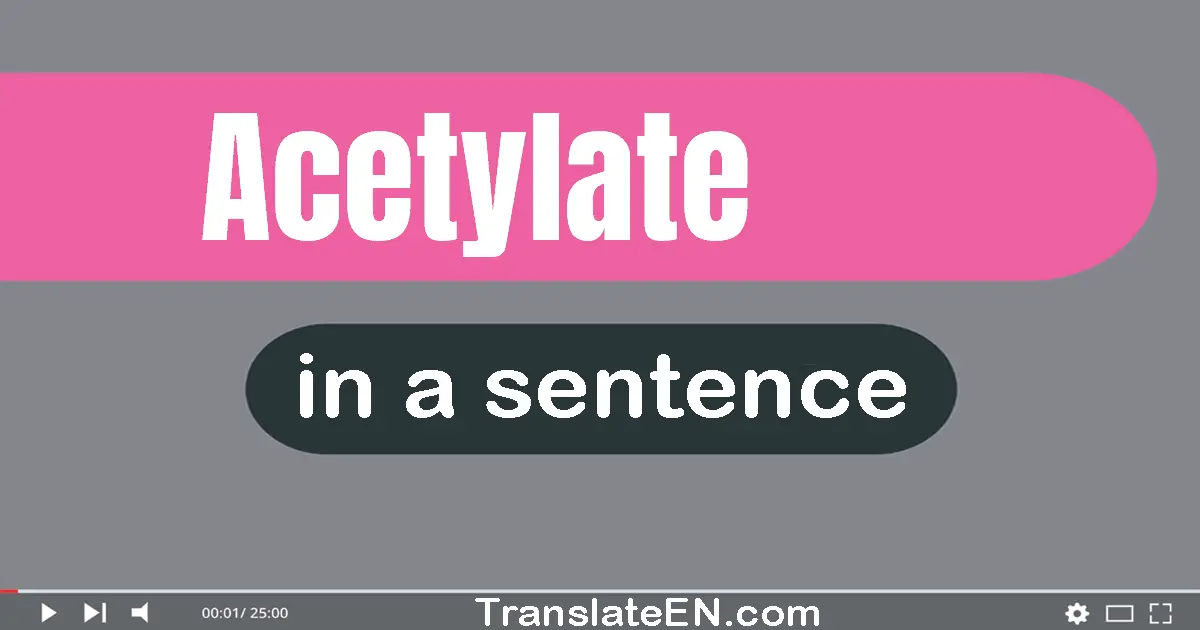Acetylate in a sentence

Acetylate meaning
Acetylate is a verb that refers to the process of introducing an acetyl group into a molecule. This chemical reaction is commonly used in organic chemistry to modify the properties of a compound, such as its solubility, reactivity, or stability. If you are studying chemistry or working in a laboratory, you may need to use the word acetylate in your writing or conversation. Here are some tips on how to use acetylate in a sentence:
1. Understand the meaning of acetylate: Before you use the word acetylate, make sure you understand what it means and how it works. Acetylation is a type of chemical reaction that involves the transfer of an acetyl group (-COCH
3. from one molecule to another. This process can be catalyzed by various reagents, such as acetic anhydride, acetyl chloride, or acetyl bromide. Acetylation can occur on different functional groups, such as amines, alcohols, phenols, or carboxylic acids, depending on the reaction conditions and the substrate.
2. Use acetylate in a sentence that makes sense: When you use the word acetylate, make sure you use it in a sentence that makes sense and conveys the intended meaning.
For example, you could say "We acetylated the amino group of the peptide using acetic anhydride and pyridine" to describe a specific chemical reaction that you performed in the lab. Or you could say "Acetylation of histones is a common epigenetic modification that regulates gene expression" to explain a biological process that involves acetylation.
3. Provide context for acetylate: When you use the word acetylate, provide some context for the reader or listener to understand what you are talking about. This could include information about the substrate, the reagents, the reaction conditions, or the purpose of the acetylation.
For example, you could say "Acetylation of cellulose improves its solubility in organic solvents" to explain why acetylation is used in the production of cellulose derivatives.
4. Use acetylate in the correct tense and form: When you use the word acetylate, make sure you use it in the correct tense and form, depending on the context and the subject of the sentence.
For example, you could say "We will acetylate the substrate tomorrow" to describe a future action, or "The substrate was acetylated using acetic anhydride" to describe a past action. You could also use the passive voice to emphasize the result of the acetylation, such as "The acetylated product showed increased stability and activity."
5. Avoid overusing acetylate: While acetylate is a useful and specific term in chemistry, it can become repetitive and confusing if used too often or inappropriately. Try to vary your vocabulary and use synonyms or related terms when possible, such as "acetylation," "acetylating agent," "acetyl group," or "acetylated compound." Also, make sure you use acetylate only when it is necessary and relevant to your topic, and not just to sound technical or impressive.
In conclusion, acetylate is a verb that describes a chemical reaction that introduces an acetyl group into a molecule. To use acetylate in a sentence, you should understand its meaning, provide context, use the correct tense and form, and avoid overusing it. By following these tips, you can communicate effectively and accurately about acetylation and related topics in chemistry.
The word usage examples above have been gathered from various sources to reflect current and historical usage of the word Acetylate. They do not represent the opinions of TranslateEN.com.
